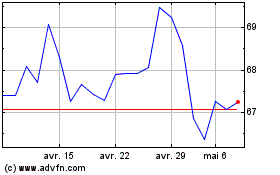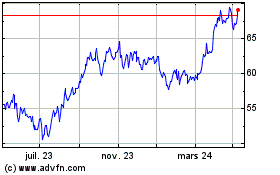The North Sea Is Suddenly, Surprisingly, an Oil Hot Spot
19 Septembre 2017 - 3:29PM
Dow Jones News
By Sarah Kent
LONDON -- For over a decade, the North Sea's once-booming oil
sector was mired in decline. Against the odds, it has emerged as an
unlikely bright spot in today's stormy global energy industry.
Investors have sunk more than $16 billion so far this year into
European deals for assets mostly located in the North Sea, a flurry
that far outstrips energy deal activity in all but American shale
country and Canada's oil sands, according to Edinburgh-based energy
consulting firm Wood Mackenzie. The biggest deal came last month,
with Total SA's $5 billion purchase of A.P. Moeller-Maersk's North
Sea-focused oil-and-gas business.
The deal was a sign major oil companies are still willing to
invest significant amounts in the region. Many are refocusing on
relatively new areas where they can grow, as private-equity funds
buy up aging assets and infrastructure that key players have been
looking to shed.
Royal Dutch Shell PLC is planning on spending $600 million to $1
billion a year in the North Sea in the coming years, while BP PLC
expects to double its production there by 2020. Norway's Statoil
ASA has greenlighted production from a new North Sea field that, at
its peak, could pump more oil than the entire nation of Ecuador, a
member of the Organization of the Petroleum Exporting
Countries.
"We see the North Sea turning things around," BP Chief Executive
Bob Dudley recently told an oil conference in Aberdeen, Scotland,
the center of the British oil industry.
The whirl of activity marks a new chapter for the vast
oil-producing region in the waters separating Great Britain from
Northern Europe.
Just last year, the U.K.'s North Sea energy industry was
described as "at the edge of a chasm" by trade association Oil
& Gas UK, as low oil prices hammered investment in a region
full of aging, depleted fields. At its peak around 2000, the North
Sea produced similar amounts of oil to Saudi Arabia, but output has
fallen by around 34% since then, a trajectory that only recently
began to reverse.
The region still faces significant challenges. Despite all the
M&A activity, only a handful of new developments have been
approved this year. And a record number of proposals to dismantle
existing infrastructure was submitted in the first half of this
year, according to Wood Mackenzie.
But the stabilization in oil prices, some new oil and gas
discoveries and the emergence of private-equity money have helped
create a sense of optimism across the North Sea industry not seen
since prices crashed in 2014.
Private-equity funds have built up war chests totaling $15
billion for North Sea acquisitions, Wood Mackenzie said. Companies
backed by funds including EIG Global Energy Partners, Carlyle Group
and CVC Capital Partners have already bought sizable asset packages
in the region.
Among the largest, after Total, was the $3.8 billion deal made
in January by Chrysaor Holdings Ltd., the EIG-backed oil company,
for a chunk of Shell's North Sea assets. Shell is now focused on
maintaining its North Sea output at around 150,000 barrels a day
into the late 2020s.
"The North Sea is in a window of opportunity," Linda Cook,
chairman of Chrysaor and chief executive of EIG's investment
vehicle, Harbour Energy, said in an interview. "We intend for this
to be the first of many acquisitions in the region."
BP has also approached potential buyers about its North Sea oil
assets -- although, like Shell, it says it remains committed to the
region.
In fact, BP and other major oil players say they are looking at
growth in the North Sea, especially in an area west of the Shetland
Islands that was once considered too difficult to develop. Chevron
Corp. is sitting on one of the region's largest undeveloped fields,
which the company says it is working to advance this year.
Total's deal last month is evidence that big oil companies
continue to see value in the region. It marked the biggest North
Sea-weighted deal in more than a decade, according to Wood
Mackenzie, and was Total's largest purchase since the oil-and-gas
megamergers at the turn of the century.
The oil-price downturn over the past three years has forced oil
producers to make deep cost cuts and driven down prices for
contractors and services. Those changes are starting to show
results.
BP has slashed its average production costs in the North Sea
from a peak of more than $30 a barrel in 2014 to less than $15 a
barrel at present. By the end of the decade, the company expects
that to come down to below $12 a barrel, Mr. Dudley said last
week.
Shell's costs have fallen by 60% -- a reduction matched at
competitors, said Steve Phimister, the company's U.K. production
director.
"The thing that has differentiated the North Sea is that we've
been using that downturn to right the ship," said Mr.
Phimister.
(END) Dow Jones Newswires
September 19, 2017 09:14 ET (13:14 GMT)
Copyright (c) 2017 Dow Jones & Company, Inc.
TotalEnergies (EU:TTE)
Graphique Historique de l'Action
De Mar 2024 à Avr 2024

TotalEnergies (EU:TTE)
Graphique Historique de l'Action
De Avr 2023 à Avr 2024
